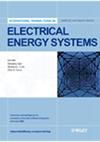Steady‐state security prediction in presence of load uncertainty
引用次数: 1
Abstract
An important problem in the Electrical Power System operation is the steady-state security prediction. In order to take into account the load uncertainty, in this paper the authors apply a Monte-Carlo method together with an opportune Security Index to evaluate in a preventive manner the probability to fall in insecure operating state, by determining the security index probability density function. For this aim, in a previous paper proposed by the authors, it has been possible to take advantage of an Artificial Neural Network, trained to evaluate the Security Index probability density function in presence of the optimal economical dispatching of the generation powers for the load forecast. In the present paper, a more complex scenario is considered where the security analysis can suggest to the dispatcher to determine also non-optimal economical operating conditions to improve security. So a new, more complex, organization of the Artificial Neural Network training stage, necessary in order to obtain increased generalization capacity in the production stage, has been considered. In the first part of the paper the used security index, the Monte-Carlo simulation and the neural network structure with its learning algorithm utilized by the authors for the particular problem are briefly recalled. Finally, a numerical application on a simple electrical test system is shown pointing out very encouraging results.负荷不确定性下的稳态安全预测
电力系统稳态安全预测是电力系统运行中的一个重要问题。为了考虑负荷的不确定性,本文通过确定安全指标概率密度函数,采用蒙特卡罗方法,结合适当的安全指标,预防性地评价了系统陷入不安全运行状态的概率。为此,在作者之前提出的一篇论文中,已经有可能利用人工神经网络,在发电功率最优经济调度的情况下评估安全指数概率密度函数,以进行负荷预测。在本文中,考虑了一个更复杂的场景,其中安全分析可以建议调度员确定非最优经济运行条件以提高安全性。因此,为了在生产阶段获得更高的泛化能力,必须考虑一种新的、更复杂的人工神经网络训练阶段的组织方式。本文第一部分简要回顾了作者针对特定问题所使用的安全指标、蒙特卡罗模拟和神经网络结构及其学习算法。最后,在一个简单的电气测试系统上进行了数值应用,取得了令人鼓舞的结果。
本文章由计算机程序翻译,如有差异,请以英文原文为准。
求助全文
约1分钟内获得全文
求助全文

 求助内容:
求助内容: 应助结果提醒方式:
应助结果提醒方式:


